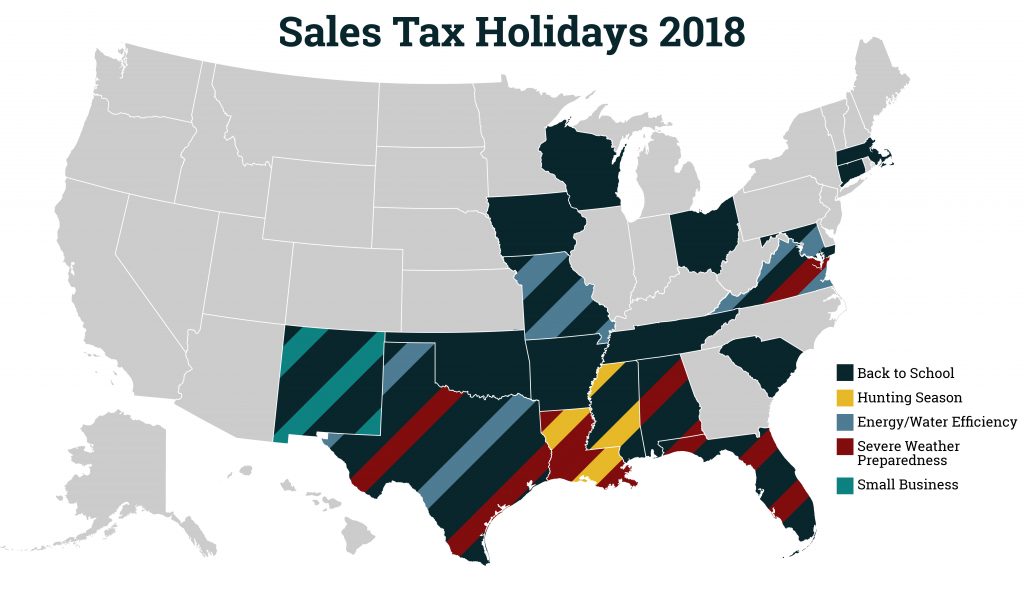Gubernatorial addresses and the prospect of teacher strikes continued to take center stage in state fiscal news this week, as governors of Connecticut, Maryland, and Utah gave speeches that all included significant tax proposals. Meanwhile, teachers walked out in Virginia, and many other states debated school funding increases to avoid similar results. State policymakers have many other debates on their hands as well, including what to do with online sales tax revenue, how to cut property taxes without undermining schools, whether and how to legalize and tax cannabis, and whether to update gas taxes for infrastructure investments.
— MEG WIEHE, ITEP Deputy Director, @megwiehe
Governors’ Budget Proposals and State of the State Speeches
- CONNECTICUT Ned Lamont, as part of his budget plan to increase state revenue, called for a sales tax on groceries and prescription drugs, a move that would take a much greater share of income from low- and middle-income families who rely on these necessities as a larger portion of their household budgets than do the wealthy. — AIDAN DAVIS
- UTAH Gary Herbert upped his support for sales tax modernization and a sales tax rate cut in yesterday’s State of the State Address, calling for a $225 million cut. This was in response to the Speaker of the House’s call for the largest single tax cut in the state’s history, advocating for a $225 million cut via personal income tax rate reductions. — LISA CHRISTENSEN GEE
- Steve Hogan of MARYLAND proposed a $500 million package of tax cuts in his address this week, through a combination of retirement income deductions, an increase in the student loan interest deduction, and business tax subsidies. But with the state mulling how to pay for recommendations from a school funding commission, many are skeptical of the plan. — DYLAN GRUNDMAN
State Roundup
- The city council in a suburb of Birmingham, ALABAMA filed a lawsuit against the state regarding the result of a ballot measure on property taxes. Alabama has one of the oldest property tax caps in the country and the failed November 2018 measure would have exempted the locality from the state cap.
- Tax cuts have costs—the message Arkansans for Responsible Spending is sharing in response to proposals to cut income taxes for the wealthiest in ARKANSAS. Also relevant to the larger conversation on investments for public priorities—legislation has been filed that would earmark taxes from the sales of cars for infrastructure spending, along with levying a sales tax on the wholesale price of motor fuel. The response has not been enthusiastic, but the bill sponsor hopes it helps spark the conversation on what should be an important priority for the legislature this year.
- In ARIZONA, legislative committees in both the House and Senate approved tax conformity bills that would cut income tax rates across the board and couple the state to federal itemized deduction changes. Gov. Doug Ducey, by contrast, has proposed that any additional revenue–as a result of conformity–be placed in the state’s rainy-day fund. Others have made the case for the funds to pay for state needs, such as education and road funding, rather than primarily benefiting the state’s high-income earners.
- Also, a bill out of ARIZONA’s state legislature aims to raise the state’s gas tax, something that has not been done in over two decades.
- In CALIFORNIA the Los Angeles teachers’ strike may be over, but the work to ensure adequate investment in public education beyond a single contract period is just heating up. Now teachers and the LA Mayor himself are turning their efforts towards the 2020 ballot measure that would assess business properties according to their market value—scaling back Prop 13.
- Also in CALIFORNIA, with sales tax revenues on cannabis falling short of projections, lawmakers are considering a temporary rate cut to boost legal recreational sales.
- After initial rejection by the COLORADO Title board, a proposal to repeal the TABOR (Taxpayer Bill of Rights) is getting a rehearing.
- FLORIDA lawmakers will consider a back-to-school sales tax holiday this year. Read our policy brief for a refresher on why these holidays are unnecessary and ineffective.
- HAWAII David Ige is pushing for increases to the state’s gas tax and vehicle registration fees to fund state highway infrastructure. Legislation has also been put forth to make the state’s Earned Income Tax Credit (EITC) refundable.
- IDAHO lawmakers proposed tax exemptions targeted at two very different groups. The first would allow qualified residents of newly constructed homes to claim the states’ disabled veteran tax exemption or circuit breaker in the first year of residency and would cost an estimated $68,000 annually. The other would provide a tax credit of up to $3,500 for reconstruction of shortline railroads and could cost up to $3.1 million annually.
- A progressive legislative agenda is what Gov. J.B. Pritzker is promising to deliver in ILLINOIS, starting with taxing recreational cannabis and with a graduated income tax in 2020.
- Add INDIANA to the list of states exploring ways to raise teacher salaries amid strikes and walkouts in other states.
- IOWA advocates have been working for years to ensure a one penny sales tax for schools is renewed, and this may be their year.
- A KANSAS proposal would allow taxpayers to itemize their state deductions even if they claim the standard deduction for their federal taxes. Supporters emphasize that this action is needed to avoid a tax hike and windfall for the state following the enactment of TCJA.
- Two lawmakers in LOUISIANA are proposing that authority to determine local tax breaks be returned to the state after ExxonMobil was denied two tax break applications by a local school board.
- There’s a bipartisan effort in MICHIGAN to close the “dark store loophole” in the state, which allows big box retailers to lower their property taxes by assessing their value the same as vacant stores. WISCONSIN Tony Evers has recently indicated that this is also a priority he will be including in his upcoming budget.
- Two legislators in MISSOURI are proposing regressive tax shifts that would devote revenue from taxing online sales to cutting income taxes.
- MONTANA legislators filed a bill that would require a two-thirds majority to pass tax increases. Currently, 15 states have supermajority requirements for tax increases which often make it harder to raise the necessary revenue to fund public priorities. And after a measure to tax e-cigarettes at 33 percent failed at the ballot last fall, SB 96 would levy a 50 percent tax on the products.
- This detailed overview of the main proposals to reduce property taxes in NEBRASKA can help make sense of the many competing plans under consideration.
- Count NEW MEXICO among the states looking to legalize recreational cannabis.
- OREGON legislators will consider raising cigarette taxes $2 per pack.
- House lawmakers in PUERTO RICO are committed to eliminating the business tax on tangible property this session, but they’ll need to find a replacement for the $409 million in annual revenue. One proposal is to levy the municipal business tax (CRIM) on the value of a product after it’s sold rather than the current levy on the wholesale value.
- In an effort to plug budget gaps and raise revenue, RHODE ISLAND’s Gina Raimondo is pushing for an expanded Amazon tax that would collect taxes from remote sellers who do not have a physical presence within the state.
- SOUTH CAROLINA Henry McMaster’s proposal to exempt veterans’ retirement income from tax is advancing quickly in the legislature.
- TEXAS legislators begin the biennial budget process with the seemingly incompatible goals of increasing school financing while cutting property taxes. Legislators must also decide if they will renew legislation allowing localities to enter property tax abatement The current law is set to expire in September 2019, and three bills have already been filed to extend the program for another ten years.
- Last week, VERMONT became the first state to legalize cannabis through the state’s legislature. Gov. Phil Scott signed the bill into law, joining 9 states and the District of Columbia in allowing for the possession of recreational cannabis.
- VIRGINIA teachers walked out in protest of massive tax breaks being awarded to Amazon while school funding suffers. A 5 percent teacher pay raise has been proposed in the state budget.
- A bill in WEST VIRGINIA to exempt Social Security from the state’s income tax passed the House of Delegates’ Finance Committee and now heads to the full House for consideration. This version of the bill would exempt all Social Security, regardless of a person’s total income, resulting in a generous tax break for the state’s high-income retirees.
- GOP lawmakers in WISCONSIN have expressed an openness to raising the gas tax in exchange for cutting an equal amount of taxes elsewhere. While such a trade may be a “win” for supporters of infrastructure funding, it would come at the cost of divesting in other critical priorities in the state like healthcare and education.
- A slew of tax policy proposals have been making their way into the debate this session in WYOMING. For instance, a proposal to broaden the sales tax base, tax groceries and lower the sales tax rate loses steam; an income tax bill and a proposal to add an additional tax on tobacco did not make their way out of committee; and a statewide lodging tax makes headway.
What We’re Reading
- The Center on Budget and Policy Priorities has a great piece on how states can improve funding and their upside-down tax codes through taxes on mansions and second homes.
- Stateline summarizes state efforts to avoid teacher walkouts and strikes by boosting school funding.
- Stateline also reports on how the federal shutdown threatens families in federal housing programs.
If you like what you are seeing in the Rundown (or even if you don’t) please send any feedback or tips for future posts to Meg Wiehe at [email protected]. Click here to sign up to receive the Rundown via email.





